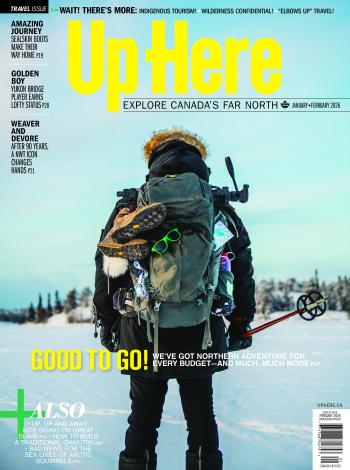Up Here is pleased to present the winner of this year’s Sally Manning Award for Indigenous Creative Non-Fiction to Steven Lonsdale for his story, Nutaralaaq: Life Within a Name.
Born and raised in Iqaluit, Lonsdale describes himself as forever a student of traditional knowledge. “I try to reflect that in my writing by combining my own experiences with the storytelling heard from Elders,” he tells Up Here.
His passion advocating for Inuit cultural awareness is evidenced in this tale about traditional naming practices. Sally Manning contest judge and acclaimed Dene author Catherine Lafferty says she was astonished by Lonsdale’s ability to invoke such emotion in such a short piece. “The images that the writer portrays of the hunter and the young man show both simply and explicitly how the naming of loved ones past can reincarnate,” says Lafferty. “The fact that the writer was able to capture this so beautifully by showcasing that these connections exist through time, space, birth and death has left me in awe.”
Fellow judge and last year’s Sally Manning winner Peter Igupttaq Autut agrees, telling our editor that he related to the themes and images in Lonsdale’s writing. “So very true in Inuit culture. A very interesting read.”
Thanks to Catherine Lafferty, Peter Igupttaq Autut and Up Here publisher Marion LaVigne for judging this year’s contest. Sally Manning adventured her way through the North for 30 years before her death in 2014. This literature award, named in her honour, was created by Manning to help Indigenous Northerners share their stories.
We thank all those who entered.
Nutaralaaq:
Life Within a Name
By Steven lonsdale
At nine-years-old, Nutaralaaq was asked by his father to watch the dog team so he could hunt the seals in the distance on top of the sea ice. Nutaralaaq watched as Akulukjuk approached the seals using his handheld seal blind. He stalked for a while and stood there with one knee on the sea ice. Nutaralaaq wondered what was taking so long but he stayed with the dogs as he was told. After a while the seals stopped basking in the sun and returned into the water. But still Akulukjuk stood there not moving. Worried, Nutaralaaq approached with the dogs only to find his father had died from a heart attack, still upright with one knee on the ice, rifle in hand.
He lived and died as a hunter.
The little boy, completely alone, rolled the full weight of a grown man onto the qamutik. He secured his father with rope and proceeded by himself to the camp three hours away.
As soon as my mother told me that story my heart sank. I could only imagine the physical, emotional and mental strength it took to take that journey, to deliver the body of your own father home. I had been thinking of baby names for my soon-to-be child and there was no doubt in my mind that I wanted this strong name.
Inuit have a tradition of naming their children after those who have passed away. I’ve been taught that it is a way to remember your loved ones and to be able to relive the memories you have of them.
In a place where hardship is still frequent, it has always been a positive way to adapt to loss.
The child not only takes on the name, but the essence of the person is also adopted. They are still their own person but in them lives the soul of the one they are named after. As the child grows we see flashes of that person that once lived. Some may have similar looking eyes or perhaps have a familiar smile, which in turn makes us smile.
In Inuit culture it is rare to call any family member by their given name. Most times we call each other by our relation—ningiu (grandmother), panik (daughter), naja (little sister), et cetera. So with the naming of a child also comes the relation with the name, too. My cousin calls my son, Nutaralaaq, by the relation of “ittuq” because that was his grandfather. My uncle before his passing called him “nuka” because that was his little brother. It is a beautiful and unique cultural practice. It is the only culture I know of where a newborn baby can be called uncle or grandmother because that’s who they were named after.
When my son was 11, I saw for the first time the great strength that he carries with his name. We had just returned from setting fish nets using a fibreglass rowboat, about 12 feet long. I had propped up the boat into the back of my truck with great difficulty and part of it hung over the tailgate. I was getting ready to leave but noticed that I forgot to load the fish tub into the bed of the truck. The boat needed to be lifted so that I could open the tailgate and place the tub underneath. I could not do it alone and my son looked at me and said, “I could do it.” The little man went under the boat and lifted it over his head. He looked like one of those power lifters at the Olympics! I could not pause to show my amazement since I had to quickly grab the gear and slide it under the boat before closing the tailgate. Immediately after, I looked at my boy with pride and cheered, “irni!” We laughed. I then told him the story of his namesake, telling him that’s why he’s so strong.
I’ve never met my grandfather and yet he is with me. I have not hunted with him but he has helped me many times. He is my son, my best friend, and his name will live on.










